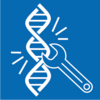IPP Research Topics
Ageing & Disease RNA Biology DNA Repair & Genome Stability Epigenetics & Nuclear Dynamics Bioinformatics & Computational Biology Gene Regulation & Evolution Proteostasis & Phase SeparationDNA Repair & Genome Stability

DNA is frequently damaged by exposure to UV radiation, oxidative stress and mutagenic chemicals. If DNA damage accumulates, it can lead to cell death or even cancer. Consequently, cells must be highly efficient at detecting and repairing DNA damage in order to survive. We study the molecular mechanisms cells use to repair damaged DNA, avoid genome instability when replicating DNA, and prevent mistakes when producing proteins. By understanding how they keep their genome intact, we hope to find new strategies for preventing cancer and slowing ageing.
Key techniques used: CRISPR/Cas9, embryonic stem cell culture, fluorescence in situ hybridisation (FISH), high-throughput microscopy, mass spectrometry, chromatin immunoprecipitation (ChIP), next-generation sequencing (NGS), flow cytometry, DNA combing.
Keywords: DNA double-strand break, DNA repair, mutation, DNA replication, telomere, transposable element, transposon, mRNA decay, protein degradation, genome instability, genome integrity, cancer, ageing.